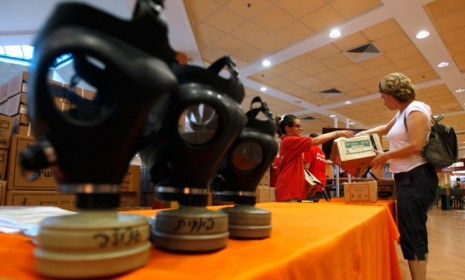Did Syria just threaten to use its chemical weapons?
The Assad regime insists it won't use WMD against its own people, reserving them instead to counter "external" threats — but what exactly does that mean?

A free daily email with the biggest news stories of the day – and the best features from TheWeek.com
You are now subscribed
Your newsletter sign-up was successful
Syria is facing increasing global pressure over its stockpile of chemical weapons, after a Syrian Foreign Ministry spokesman said the regime would only use WMD against "external aggression," not against Syrian civilians. President Obama said it would be a "tragic mistake" if the government of Syrian President Bashar al-Assad used its toxic nerve agents, mustard gas, and other unconventional weapons, no matter what the target. Would Assad really dare attack anyone with chemical weapons? Here, a brief guide:
What exactly did Syria say about its chemical weapons?
The Foreign Ministry spokesman, Jihad Makdissi, said that "any stocks of WMD or any unconventional weapon that the Syrian Arab Republic possess would never be used against civilians or against the Syrian people during this crisis." He added that such weapons would "be used only and strictly in the event of external aggression against the Syrian Arab Republic." Despite the clear and emphatic wording, however, the statement only created confusion.
The Week
Escape your echo chamber. Get the facts behind the news, plus analysis from multiple perspectives.

Sign up for The Week's Free Newsletters
From our morning news briefing to a weekly Good News Newsletter, get the best of The Week delivered directly to your inbox.
From our morning news briefing to a weekly Good News Newsletter, get the best of The Week delivered directly to your inbox.
Why is that?
Assad's government has claimed that the armed rebels it's fighting are foreigners — namely Islamist terrorists trying to exploit the country's political turmoil to expand their reach in the Middle East. To some, that suggests that Syria was laying the groundwork to justify the possible use of chemical weapons if it can't overcome the opposition using its superior conventional arsenal.
How has the Syrian government responded to such interpretations?
It has been back pedaling since Makdissi made his statement. The state-run Syrian Arab News Agency said Tuesday that Makdissi wasn't confirming that Syria has chemical weapons — he was merely trying to counter a "methodical media campaign" aiming to persuade the world that Syria was preparing to unleash chemical weapons. The news agency said those reports were cooked up to build public support for "the possibility of military intervention under the false premise of weapons of mass destruction (similar to what happened with Iraq)."
A free daily email with the biggest news stories of the day – and the best features from TheWeek.com
Does Syria have WMD or doesn't it?
The international consensus is that the nation has a lot of WMD — the fourth largest such stockpile in the world — which it acquired to counter Israel's presumed nuclear capabilities. Syria is believed to have three plants producing the weapons, which reportedly include sarin, mustard gas, and possibly even VX nerve gas. It also has missiles and artillery shells to deliver them.
Would it use them?
That's another question. Some analysts say Assad might try anything to save himself if rebels continue making gains. But there's little tactical advantage to using chemical weapons in an urban conflict like Syria's civil war, Olivier Lepick of the Foundation for Strategic Research in Paris tells Agence France Press. "The regime knows that if it did so it would lose the support of China and Russia," which are using their vetoes to shield Assad from the wrath of the United Nations Security Council.
Sources: AFP, BBC News, CNN, Foreign Policy, New York Times
-
 Growing a brain in the lab
Growing a brain in the labFeature It's a tiny version of a developing human cerebral cortex
-
 How are Democrats trying to reform ICE?
How are Democrats trying to reform ICE?Today’s Big Question Democratic leadership has put forth several demands for the agency
-
 Silicon Valley: Worker activism makes a comeback
Silicon Valley: Worker activism makes a comebackFeature The ICE shootings in Minneapolis horrified big tech workers